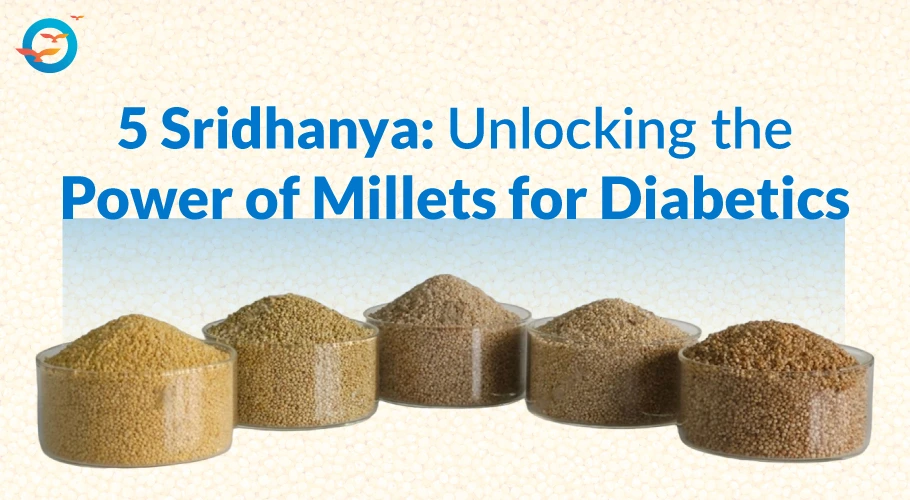Millets for Diabetic patients

Best Millets for Type 2 Diabetes
Millets are gaining popularity for their health benefits. But are they truly a good choice for diabetics?
Let's explore the potential benefits and considerations:
What Are Millets?
Millets are a group of small-seeded grasses cultivated as cereal crops. They include varieties such as pearl millet, finger millet, foxtail millet, and sorghum. These hardy grains are known for their ability to grow in diverse climates and soil conditions.
Millets have been cultivated in India for thousands of years, dating back to the Indus Valley Civilization. They have long been a staple food in many parts of the country, particularly in arid and semi-arid regions. Traditional Indian cuisine features various millet-based dishes, highlighting their cultural significance.
Millets Benefits for Diabetes
Millets offer several nutritional advantages over common grains like wheat and rice:
-
Higher protein content:
Millets generally contain more protein than rice and are comparable to or exceed wheat in protein content. -
Rich in fiber:
Millets are excellent sources of dietary fiber, which aids digestion and promotes a feeling of fullness. -
Lower carbohydrate content:
Compared to wheat and rice, millets typically have a lower carbohydrate content, making them a suitable option for those managing their carbohydrate intake.
Millets are considered "positive grains" due to their numerous benefits:
- Nutritional profile: Rich in vitamins, minerals, and antioxidants
- Environmental sustainability: Require less water and are more resistant to pests and diseases
- Climate resilience: Can withstand harsh growing conditions
- Economic value: Provide income opportunities for small-scale farmers
- Gluten-free: Suitable for those with gluten sensitivities or celiac disease
What do Diabetics Need?
Diabetics need to manage their blood sugar levels carefully. A low-carb diet helps achieve this by reducing the intake of foods that rapidly increase blood glucose.
However, it's crucial that such a diet also provides satiety (feeling of fullness) to prevent overeating and maintain consistent blood sugar levels throughout the day.
Why millets are good for diabetics?
Millets are excellent for diabetics because:
- Low glycemic index:
Millets have a lower glycemic index compared to wheat and rice, meaning they cause a slower and lower rise in blood sugar levels. - High fiber content:
The high fiber in millets slows digestion, providing a gradual release of glucose into the bloodstream and promoting a feeling of fullness. - Protein-rich:
The higher protein content in millets contributes to satiety and helps stabilize blood sugar levels. - Complex carbohydrates:
Millets contain complex carbs that are digested slowly, preventing rapid spikes in blood glucose.
These properties make millets a suitable grain choice for diabetics, offering the benefits of a low-carb diet while providing the necessary nutrients and satiety to maintain a balanced diet.
Millets are highly versatile and can be used in a variety of recipes, including porridge, salads, soups, bread, and even desserts, making them easy to incorporate into different meals.
The 5 Sridhanya (millets) which can be added to the daily diet are as follows -
- Little millet
- Kodo millet
- Barnyard millet
- Foxtail millet
- Brown top millet.
Word of Caution:
While millets are nutritious, they aren't suitable for everyone. Limitations include some conditions like hypothyroidism and renal diseases. Certain individuals may need to limit their intake, and the frequency and quantity should be determined by health experts.
Do you want to know more about Best Rice for Diabetics, visit our blog.
FFD advice:
We highly recommend our participants to opt for millets for their benefits and versatility. You can visit the recipe section on our website to find numerous millet recipes that are tasty and nutritious and easy to prepare at the same time.
Make a healthy choice ...Opt for millets
FAQ's
Why millets are good for diabetics?
Millets are beneficial for diabetics because they have a low glycemic index, helping to prevent spikes in blood sugar levels. Rich in fiber and nutrients, they improve insulin sensitivity, support sustained energy release, and promote better digestion, making them an ideal choice for managing diabetes effectively.
Is millet rice god for diabetics?
Yes, millet rice is good for diabetics. It has a low glycemic index, which helps regulate blood sugar levels. Rich in fiber and essential nutrients, millet rice improves digestion and promotes better insulin sensitivity, making it a healthy, diabetic-friendly alternative to regular white rice.
Is millet flour good for diabetics?
Yes, millet flour is good for diabetics. It has a low glycemic index, which helps control blood sugar levels. Rich in fiber, vitamins, and minerals, millet flour promotes better digestion, improves insulin sensitivity, and provides sustained energy, making it a healthy option for managing diabetes.

